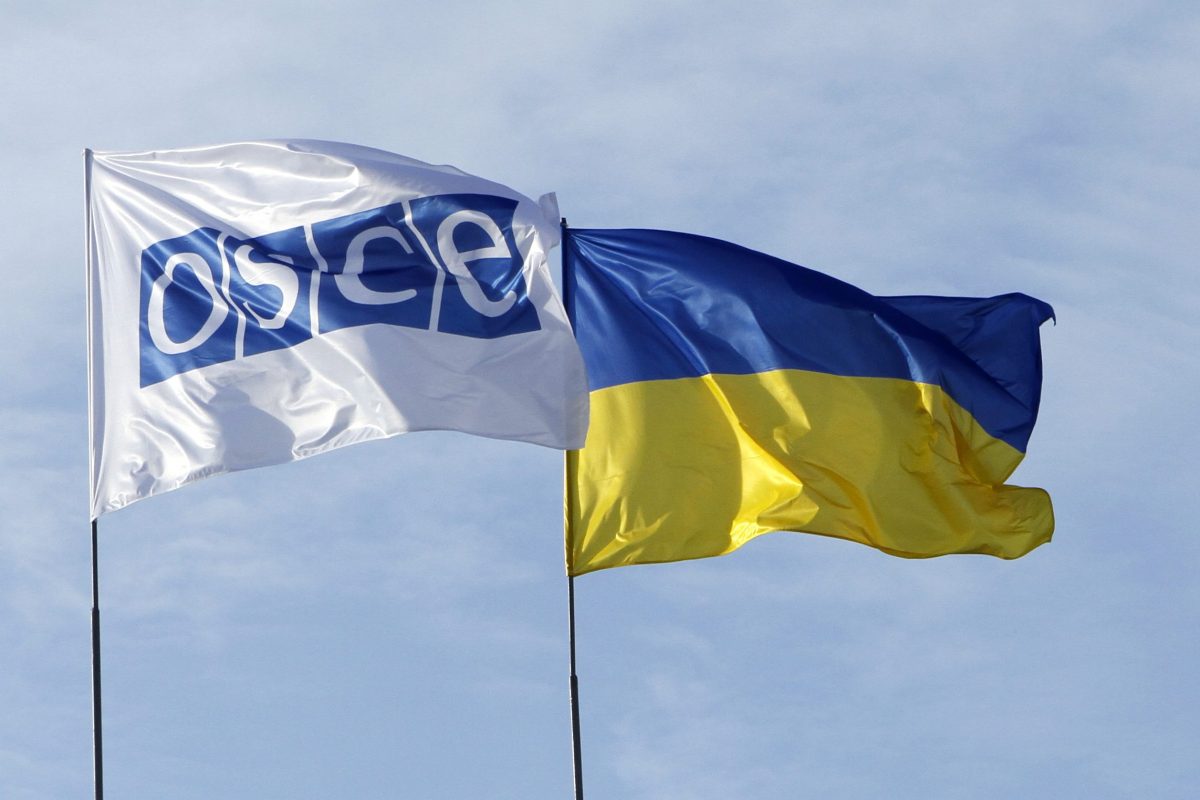The OSCE Caught Between a Rock and a Hard Place
The Importance of Functional Protection for OSCE Officials and the Struggle to Provide It
The Organization for Security and Cooperation in Europe (OSCE) is currently facing unprecedented difficulties created by one of its participating States, namely Russia. When Russia launched its full-scale invasion of Ukraine on 24 February 2022, the OSCE Special Monitoring Mission (SMM) to Ukraine was still active and remained so until 31 March 2022. Even after this latter date, OSCE observers continued to be sent to Ukraine as part of a mission based on the Moscow Mechanism, an undertaking approved by 45 of the 57 participating States after the SMM ended. In April 2022, three OSCE mission members of Ukrainian nationality were arrested by Russian proxy authorities in Luhansk and, according to Alexander Lukashevich, Russia’s permanent OSCE representative, criminal proceedings for espionage were to be initiated against them. Subsequently, two mission members were convicted of treason by the so-called ‘High Court of the Republic of Luhansk’. These individuals are still in prison, which demonstrates that the OSCE has difficulties protecting its officials in the field.
The event typifies the now-all-too-familiar scenario where International Organisations (IOs) cannot provide functional protection for their officials who are detained by State authorities and non-State actors operating in their mission areas. This has implications for all involved: As OSCE is an international employer that routinely deploys officials to dangerous environments, its officials rely on the organisation protecting them as much as the OSCE relies on its officials’ readiness to take risks to fulfil the organisation’s functions. This blog post addresses whether the OSCE meets its internal obligations on functional protection and the external challenges that come with it.
Functional Protection, Its Legal Basis and Practical Implications
Functional protection is provided by IOs to their officials to avert or remedy situations of danger in which officials find themselves while performing their official duties. This typically involves staying in contact with detained officials, monitoring relevant judicial proceedings, providing legal assistance and negotiating their release with the detaining actor. These protective measures should not be seen as relating to international immunities where IO officials, acting in their official capacity, are exempt from the domestic jurisdiction of a host State, making the arrest of such officials internationally unlawful. As such, functional protection is a mechanism provided by an IO for its officials when immunity is disregarded by a State or when the latter deems such immunity not applicable, e.g. because the host State considers the reason for the arrest to be a private act contrary to the Secretariat’s assessment.
Obviously, the provision of and respect for functional protection is of great relevance for the affected officials. However, when the International Court of Justice (ICJ) first began formulating this concept, it was confronted with the fact that IO Statutes and internal rules were silent on the matter. This did not stop the Court from introducing the concept of functional protection as one of the UN’s rights vis-à-vis its members but also as a UN’s duty vis-à-vis its officials, both implicitly embodied in the UN Charter. In its 1949 Reparation for Injuries Advisory Opinion, the Court stated: “Both to ensure the effective and independent performance of these missions and to afford effective support to its agents, the Organization must provide them with adequate protection. (…) In order that the agent may perform his duties satisfactorily, he must feel that this protection is assured to him by the Organization and that he may count on it”. Since 1949, the UN has had many instances that required it to provide functional protection. One infamous example was that of Liviu Bota, a Romanian citizen and the head of the UN Institute for Disarmament Research (UNIDIR), a relatively high-ranking UN official, who disappeared in Romania in 1985. In early 1986, the UN received a cable from the UNDP office in Bucharest with a message allegedly from Bota to the UN Secretary-General stating that he wanted to resign from his post at the UN and work for the Romanian government. As a part of its functional protection obligation, the UN gave little credence to this message as both its source and author were unclear. Furthermore, concerns about Bota’s whereabouts and circumstances grew after repeated communication efforts failed, prompting the UN to ask influential members States to intervene. The extraordinary efforts of the UN to secure Bota’s release, especially those of the Secretary-General, were ultimately successful. The Bota case illustrates in many ways what functional protection should look like – persistent and repeated efforts over a long period, through fraught and difficult processes if required as well as efforts to secure assistance, if needed, from Member States or other actors who may have leverage in the given situation.
Caught Between Internal Obligations and External Challenges
Interestingly today, some 70 years after the ICJ was first confronted with silence on the matter, almost no IO has explicit provisions on functional protection in its internal laws, presumably because most of them do not require their officials to carry out activities in hazardous places. The OSCE is a notable exception to this: With activities centred on civilian crises and post-conflict management, it is evident that OSCE officials and mission members regularly operate in dangerous environments. Consequently, OSCE’s Staff Regulations and Staff Rules provide that: “OSCE officials shall be entitled to the protection of the OSCE in the performance of their duties within the limits specified in the Staff Rules“. The term “officials” is understood by the OSCE to include short-term mission members and, therefore, includes the detained Ukrainian mission members mentioned above. The cited provision is fleshed out by a manual which specifies the actions the OSCE should undertake to provide effective legal support for detained officials, including inquiring about the legality of their arrest and the circumstances thereof. The manual also determines the procedures to contact the meddling State and how to provide the official with legal assistance. This is fully in line with the ICJ’s demand that an official “must feel that protection is assured to him by the Organization and that he may count on it”. However, while the OSCE’s assurances to its officials that it will do all it can to protect them is well-intentioned, the organisation faces serious challenges to live up to those assurances in the real world.
In the Ukrainian case cited above, the OSCE did and continues to put forth great efforts to exercise functional protection for its detained officials by constantly trying to keep in contact with Russia’s Luhansk proxies regarding the officials’ case, location and status while also involving several participating States to intervene on a diplomatic level. Unfortunately, the OSCE has to date failed to secure their officials’ release. However, this does not mean that the OSCE has violated its internal duty vis-à-vis the detained officials as providing functional protection is an organisational due diligence duty, i.e. an obligation of conduct rather than result which is, understandably, limited by what is factually possible: without cooperation from a detaining authorities, efforts to provide functional protection can quickly be exhausted and reduced to a series of (often ineffective) diplomatic reproaches. This is especially true when the uncooperative State hides behind ‘autonomous’ proxies with which it claims to have limited influence. As such, if at some point the detained officials were to lodge a claim for damages against the OSCE based on its Staff Regulations, it would be unlikely to succeed as the organization seems to have put forth some reasonable effort to provide functional protection.
The reasonableness of the efforts is decisively defined by the environment in which the OSCE operates. For the OSCE, the situation is complicated as the organisation’s external challenges stem not only from uncooperative participating States but also from its disputed international status. The ICJ’s 1949 Reparation for Injuries Opinion, which focused on the UN, developed a functional protection rationale that can easily be applied to every other IO as they have undisputed international legal personality, i.e. they are capable of bringing a claim against an uncooperative State. However, the OSCE is the odd one out in this crowd as the status of the OSCE under international law remains unclear because, inter alia, it has no constituent instrument. Moreover, due to political differences between key participating States, some of these States, including Russia, refuse to recognise the OSCE’s international legal personality and, as such, deny it the legal status of an IO. For OSCE officials, this creates additional uncertainty as neither their own nor the organisation’s immunity is built on a permanent legal basis and must be established by ad hoc means with each State hosting a mission. In addition, OSCE decisions on mission deployments are adopted by consensus, which meant that Russia was able to block the extension of the SMM, which abruptly deprived the appointed officials of their immunity protection. That said, according to the present authors’ view, the OSCE’s disputed international personality has no bearing on the OSCE Secretary-General’s right, as the head of the OSCE administration, to exercise functional protection on behalf of the detained officials. This right has its legal basis in the participating State’s agreement in the OSCE’s overall functions to the effect that they are precluded from contesting this right with reference to the international personality dispute. While some participating States are less than ideal partners in the OSCE’s efforts to protect its officials, non-State actors have an even easier time dismissing the OSCE’s status, rights and efforts if they have not agreed to the OSCE’s activities.
In light of the foregoing, it can be said that functional protection is for IO officials a vital concept that is too often ignored by States and seemingly always difficult to enforce; this volatile mix is made worse in the case of the OSCE because of the organisation’s disputed legal status. The very real costs of this are being paid by OSCE officials.

Melissa Rudigier is research fellow at the Department of International Law and doctoral candidate at Paris Lodron University Salzburg.


Kirsten Schmalenbach is University Professor for Public International and European Law at Paris Lodron Universität Salzburg.